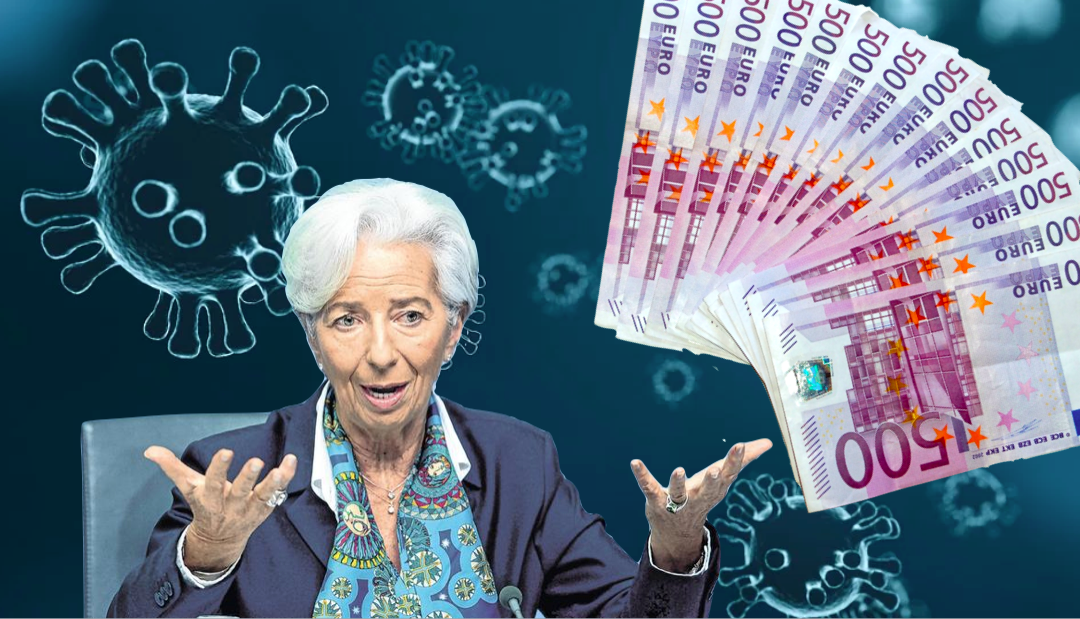The ECB launched a massive 750 billion euro plan to cope with the Coronavirus crisis. But these measures will only work if national governments spend as much as is necessary and outline an ambitious plan to tackle the recession.
By
Stanislas Jourdan – Executive Director of Positive Money Europe
Cross-posted from Positive Money Europe

On the night of Wednesday, March 18th, the Governing Council of the ECB decided to launch a special Quantitative Easing (QE) programme – aptly named the Pandemic Emergency Purchase Programme (PEPP) – to address the current crisis. The plan consists of €750 billion, which the ECB will invest by purchasing debt from governments and corporations. The programme will be conducted until the end of 2020 when the crisis will hopefully be over. Quite exceptionally, these funds can be spent in a flexible manner, meaning that there is no commitment to inject specific amounts per month.
The ECB’s decision – which was made during an emergency teleconference call during the night – came in response to the turmoil on financial markets. Earlier in the week, yields on Italian bonds jumped above 3% for the first time in over a year, with similar performance for the Spanish and Portuguese 10-year bond yields. This development signalled investors’ doubt that those countries will be able to fight the impact of coronavirus without going bankrupt.
The market’s concerns, however, were actually triggered by the ECB itself. Last week, Lagarde made an unfortunate statement, saying the ECB’s role was not to “close spreads.” This comment was rightly interpreted as a huge deviation from her predecessor’s commitment to do “whatever it takes” to prevent a new Eurozone crisis, including by purchasing large amounts of debt from Eurozone countries.
After a Eurogroup meeting earlier this week that failed to reassure markets, the ECB was under growing pressure to restore faith that it will act to avoid governments debt cost to peak when they most need to spend.
By announcing another big QE programme, the ECB has fixed its own mistake. Indeed, what the PEPP means is that the ECB will intervene as much as needed to make sure governments can borrow on markets at an affordable price. With this strong ECB support, it will be easier for governments to finance the urgent policies that are required now, without fearing that growing deficits will spur doubts on their solvency.
But will countries take advantage of this? With the current policy response, it is clear that after having defeated the virus, EU countries will find themselves with ballooning private and public debt. Financially vulnerable countries such as Italy fear that despite the flexibility granted the spending will still increase its huge debt, with horrible consequences in the aftermath of the crisis.
The fear of spending “too much”: what to do now?
The first approach we recommend would be to issue the new debt at the European level instead of a national level. By pooling debt among member states, for example by letting the European Stability Mechanism (ESM) issue “Coronabonds” or Eurobonds, this would make sure that the cost of this recession does not overburden national budgets. The cost of new debt would be cheaper as well, as the ESM currently borrows at a negative interest rate. This is partly because the ECB already purchases up to 50% of ESM bonds– as part of both QE and PEPP, thus contributing to pushing the yield below zero.
Such “Eurobonds” were a very controversial issue during the last crisis. Northern countries opposed the idea, as they saw it as a way for some countries to “free-ride” by borrowing money from markets at a cheaper cost. But this issue of moral hazard is irrelevant today, as we are facing an external crisis which was not caused by overspending by particular governments. All countries are affected regardless of their past budgetary decisions, and this is why a united response should involve common debt issuance.
The ECB could also tackle the crisis without boosting debt by creating money directly into the economy through ”helicopter money”. Under this proposal, which Positive Money Europe has been advocating for years, the ECB would make direct transfers to households, allowing them to spend in the economy.
Given the magnitude of the upcoming recession, a big boost in spending will be needed after the health crisis has been overcome. Helicopter money would be extremely powerful to kickstart the economic recovery since it would allow citizens to start spending again, but also to pay back loans and bills arrears – whose payments were rightly suspended during the containment period. Since it would be financed by newly created central bank money, helicopter money would not create more debt.
Helicopter money is legally possible, but complex to implement due to institutional and operational difficulties. This is why it is urgent for the ECB to start preparing its implementation, in particular by initiating a dialogue with the Eurogroup and the European Parliament to envisage ways of coordinating such a programme.
The health crisis we’re going through is an opportunity to revamp the Eurozone’s architecture to make sure it is well-equipped to tackle a recession, and to build a more fair, sustainable and democratic economy. New instruments which have never been envisaged, such as helicopter money, are now becoming part of the discussion.
We will keep following these developments, making sure that both short-term and long-term consequences are taken into account when formulating next steps.


Be the first to comment